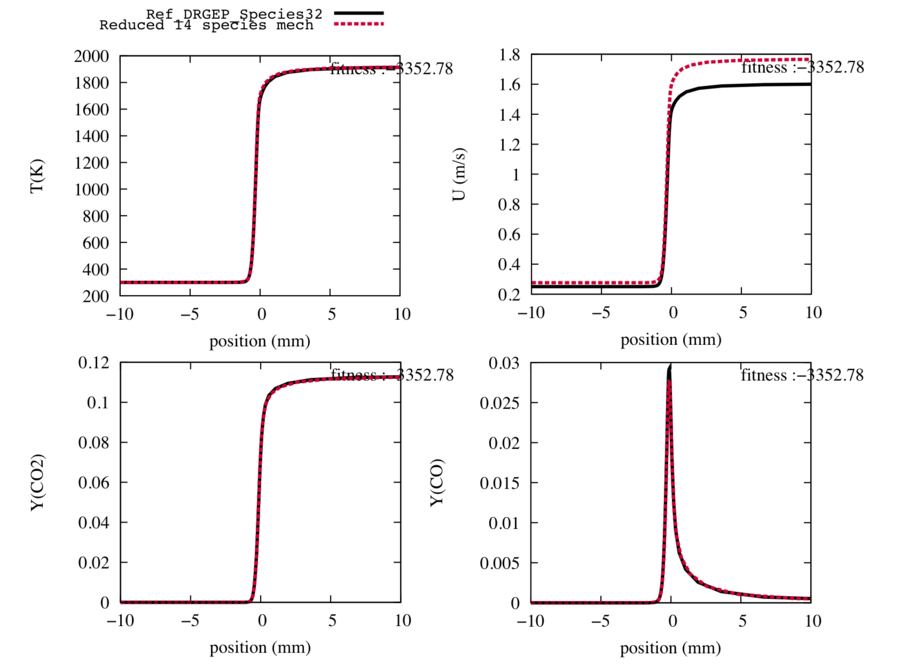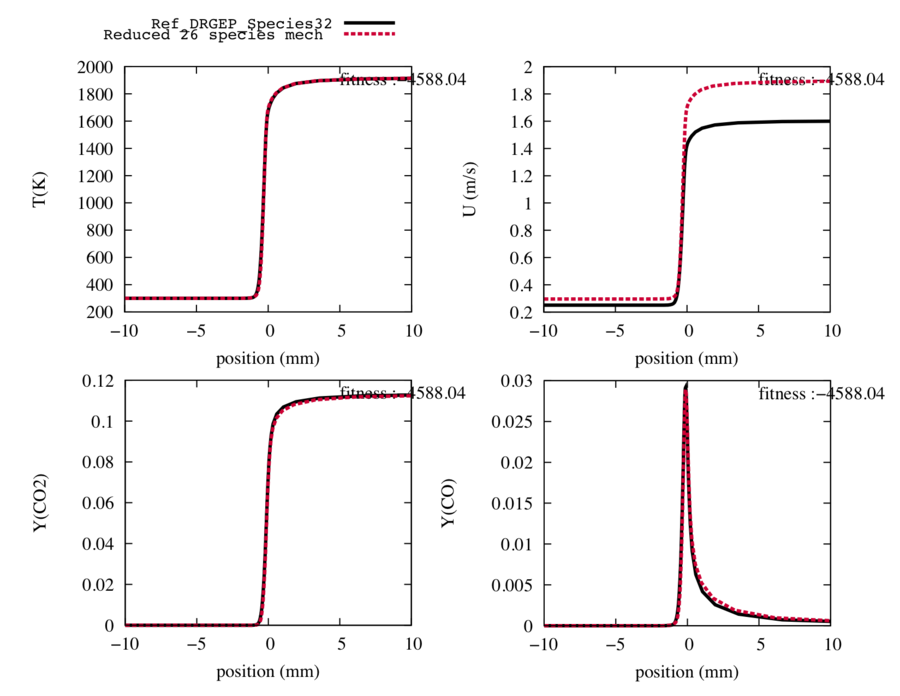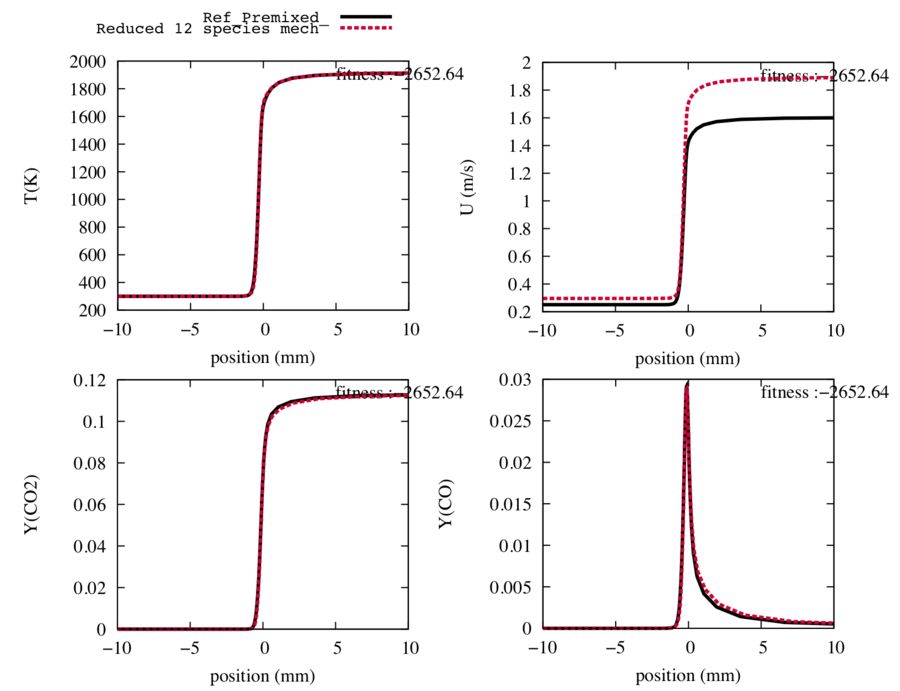Difference between revisions of "Premix CH 4/Air flame with scheme GRI12"
(→QSS step) |
(→QSS step) |
||
| Line 102: | Line 102: | ||
| − | + | -- | |
| − | + | -- | |
| − | + | ||
| − | + | ||
| − | + | ||
| − | + | ||
| − | + | ||
| − | + | ||
| − | + | ||
| − | + | ||
| − | + | ||
| − | + | ||
| − | + | ||
| − | + | ||
| − | + | ||
| − | + | ||
| − | + | ||
| − | + | ||
| − | + | ||
| − | + | ||
| − | + | ||
| − | + | ||
| − | + | ||
| − | + | ||
| − | + | ||
| − | + | ||
| − | + | ||
| − | + | ||
| − | + | ||
| − | + | ||
| − | + | ||
| − | + | ||
| − | + | ||
| − | + | ||
| − | + | ||
| − | + | ||
| − | + | ||
| − | + | ||
| − | + | ||
| − | + | ||
| − | + | ||
| − | + | ||
| − | + | ||
| − | + | ||
| − | + | ||
| − | + | ||
| − | + | ||
| − | + | ||
| − | + | ||
| − | + | ||
| − | + | ||
| − | + | ||
Revision as of 14:29, 5 July 2017
Contents
Objectives
The Stochastic_GRI12 test case describes a reduction of the GRI1.2 scheme for a 1D premixed flame. Starting with 32 species and 177 reactions, we reduce to 14 species and 26 reactions.
Key parameters
The target species considered for this test case are O2, CO and CO2. The characteristics of the premixed flame are displayed below :
listFlames.push_back(new PremixedFlames(/*T_fuel*/ 300,
/*T_ox*/ 300,
/*Pressure*/ 1E+05,
/*Ratio*/ 0.75,
/*Y_fuel*/ "CH4:1.0",
/*X_fuel*/ "",
/*Y_ox*/ "O2:0.21, N2:0.79",
/*X_ox*/ "",
/*reference_flame_path*/ "flames/flame__Phi_0_75__P_100000__T_300.cantera",
/*flame_path*/ "flames/flame"));
Results
DRGEP step
While running the DRGEP species step, your terminal should display the following information :
scheme : GRI12
number of species : 32
number of reaction : 177
reference flame : flames/flame__Phi_0_75__P_100000__T_300.cantera
Pressure : 1 bar
equivalence ration : 0.75
Composition : <O2:0.202024>
<CH4:0.0379821>
<N2:0.759994>
followed by the the species associated with their rank :
4.17578965277519e-189 AR 1.81320667696424e-06 HCCOH 3.33272520534669e-05 C2H 0.000136594690602079 CH2CO 0.000228724937160335 C 0.00039194258246205 C2H2 0.000909271897890726 HCCO 0.00324304055657054 CH 0.00391278892730799 C2H3 0.00395833642581853 CH3OH 0.00517918655958378 CH2OH 0.0158390004661296 C2H4 0.0158390004661296 C2H5 0.0160151369051444 CH2(S) 0.0209164664682532 C2H6 0.0317122146887158 CH2 0.0395596174129288 H2O2 0.0796917798682698 H2 0.0949180222420726 CH3 0.108929211050051 HCO 0.123697044495215 CH2O 0.154156160901222 H2O 0.165970760424094 CH3O 0.222439341655666 O 0.292243743837601 HO2 0.501413374426018 OH 0.501449580770414 H 1 O2 1 CH4 1 CO 1 CO2 1 N2
From a detailed 32 species scheme, we obtain reduced schemes (31 to 14 species). and we choose the one with 14 species for the next step.
Fig1 : Comparison between the reference trajectories of the target species, the temperature and the flame speed (in black), and the trajectories computed with the reduced mechanism with 14 transported species and 42 reactions, after a DRGEP species reduction (in red).
From the reduced scheme with 14 species, the DRGEP reaction step displays the associated 42 reactions (forward, reverse and global) with their rank :
-- --
After this step, by comparing the reference trajectories with the new ones, we choose to delete 16 reactions, so the next step is performed with 14 species and 26 reactions.
Fig2 : Comparison between the trajectories of the target species, the temperature and the flame speed computed with the reduced 14-species 42-reaction mechanism (in black) , and the trajectories computed with the reduced mechanism with 14 transported species and 26 reactions after a DRGEP reaction reduction (in red).
QSS step
The QSS step provides the QSS criteria of each species and the different links with the others species :
-- --
We choose to put the species CH3O and HCO in QSS hypothesis due to their low QSS coefficient. The species HO2 could have been a good candidate too but it is linked to himself (non linearity).
In order to obtain the trajectories of the 14-species 26-reaction reduced scheme with these 2 species in QSS hypothesis, we run the getQSSfile step and we obtain the following graphs.We observe that the final state and the shape of the trajectories are conserved. It is under these conditions that the optimisation step will be efficient.
Fig3 : Comparison between the reference trajectories of the target species, the temperature and the flame speed (in black), and the trajectories computed with the reduced mechanism with 12 transported species and 26 reactions after a DRGEp reaction reduction (in red).


